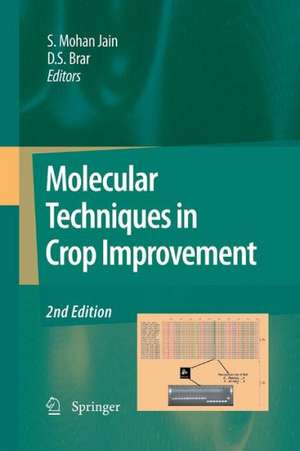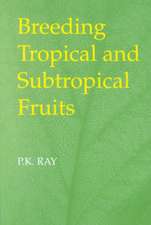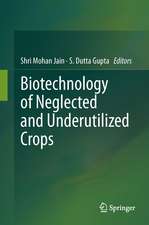Molecular Techniques in Crop Improvement: 2nd Edition
Editat de Shri Mohan Jain, D.S. Braren Limba Engleză Paperback – 2 noi 2014
| Toate formatele și edițiile | Preț | Express |
|---|---|---|
| Paperback (1) | 2111.14 lei 43-57 zile | |
| SPRINGER NETHERLANDS – 2 noi 2014 | 2111.14 lei 43-57 zile | |
| Hardback (1) | 2122.97 lei 43-57 zile | |
| SPRINGER NETHERLANDS – 18 mar 2010 | 2122.97 lei 43-57 zile |
Preț: 2111.14 lei
Preț vechi: 2574.56 lei
-18% Nou
Puncte Express: 3167
Preț estimativ în valută:
403.97€ • 422.84$ • 336.23£
403.97€ • 422.84$ • 336.23£
Carte tipărită la comandă
Livrare economică 31 martie-14 aprilie
Preluare comenzi: 021 569.72.76
Specificații
ISBN-13: 9789400795006
ISBN-10: 9400795009
Pagini: 784
Ilustrații: IX, 772 p.
Dimensiuni: 155 x 235 x 41 mm
Greutate: 1.08 kg
Ediția:2nd ed. 2009
Editura: SPRINGER NETHERLANDS
Colecția Springer
Locul publicării:Dordrecht, Netherlands
ISBN-10: 9400795009
Pagini: 784
Ilustrații: IX, 772 p.
Dimensiuni: 155 x 235 x 41 mm
Greutate: 1.08 kg
Ediția:2nd ed. 2009
Editura: SPRINGER NETHERLANDS
Colecția Springer
Locul publicării:Dordrecht, Netherlands
Public țintă
ResearchCuprins
Plant Breeding in the genomics era.- QTL Analysis in Plant Breeding.- Comparative Genomics in Crop Plants.- Functional Genomics For Crop Improvement.- Bioinformatics Tools for Crop Research and Breeding.- Molecular markers and their application.- Gene-Based Marker Systems in Plants: High Throughput Approaches for Marker Discovery and Genotyping.- Automation of DNA Marker Analysis for Molecular Breeding in Crops.- Pyramiding Genes for Enhancing Tolerance to Abiotic and Biotic Stresses.- Application of Molecular Markers for Breeding Disease Resistant Varieties in Crop Plants.- Molecular Markers Based Approaches for Drought Tolerance.- Molecular Markers for Characterizing and Conserving Crop Plant Germplasm.- Genomics.- Rice Genomics.- Genomics for Wheat Improvement.- TILLING for Mutations in Model Plants and Crops.- Microarray Analysis for Studying the Abiotic Stress Responses in Plants.- Roles of MicroRNAs in Plant Abiotic Stress.- Molecular Tools for Enhancing Salinity Tolerance in Plants.- DNA Microarray as Part of a Genomic-Assisted Breeding Approach.- Unravelling Gene Function Through Mutagenesis.- Techniques in Plant Proteomics.- Metabolomics: Novel Tool for Studying Complex Biological Systems.- Transcriptomic Analysis of Multiple Enviornmental Stresses in Plants.- Transgenic Technologies.- Marker-Free Targeted Transformation.- Promoter Trapping in Plants Using T-DNA Mutagenesis.- Plant Genome Engineering Using Zinc Finger Nucleases.- Cisgenesis.- Gene Stacking.- Gene Silencing.- Plant RNAi and Crop Improvement.- Metabolomics in Fruit Development.- Genetic Engineering in Floriculture.- Transgenesis and Genomics in Forage Crops.
Notă biografică
Textul de pe ultima copertă
The first edition of this book, "Molecular techniques in crop improvement" published in 2002 provided comprehensive information on the latest tools and techniques of molecular genetics and applications in crop improvement, and highlighted molecular genetics from the perspective of plant breeders. Since then, major advances have been made in molecular tagging of genes/QTLs governing complex agronomic traits, identification of candidate genes and in applying marker assisted breeding for tolerance to biotic and abiotic stresses and quality traits. Recent advances in transgenic technologies, genome sequencing and functional genomics offer tremendous opportunities to support plant breeding programs. We have covered new developments in molecular biology and their potential applications in plant breeding in this second edition. The book has a total of 31 chapters and divided into 4 sections: A) Plant breeding in the genomics era, B) Molecular markers and their application, C) Genomics, andD) Transgenic technologies. The book features major topics, which are QTL analysis, comparative genomics, functional genomics, bioinformatics, DNA marker technology automation, gene-based marker systems, , application of molecular markers for tolerance to biotic and abiotic stresses as well as in germplasm conservation, gene pyramiding, gene silencing, TILLING, CISGENESIS, microarray, metabolomics, proteomics, transcriptomics, microRNAs, marker-free transformation, gene targeting/homologous recombination, and genetic engineering. This book will be especially useful to scientists engaged in molecular genetics and plant breeding. It will also be a valuable book for the graduate and post graduate students specialising in crop science, genetics, plant breeding and biotechnology.
Caracteristici
Deals with molecular tools in plant breeding, molecular marker assisted breeding, gene silencing, functional genomics and genetic engineering








